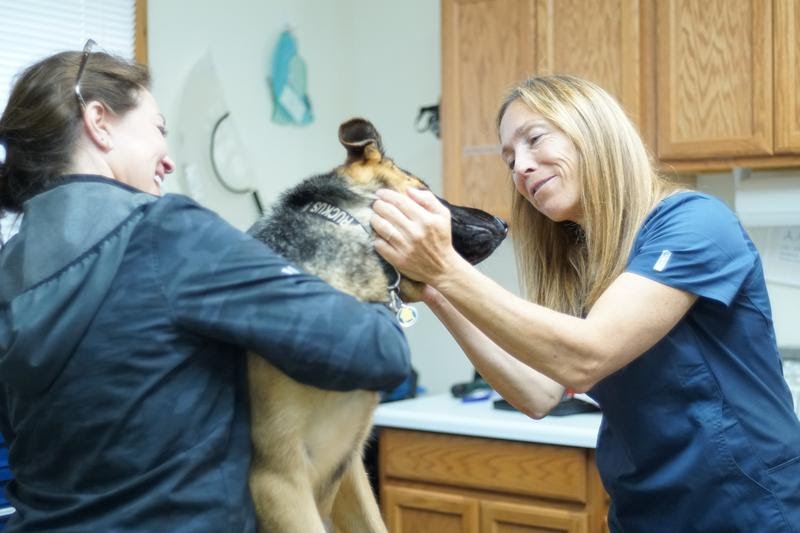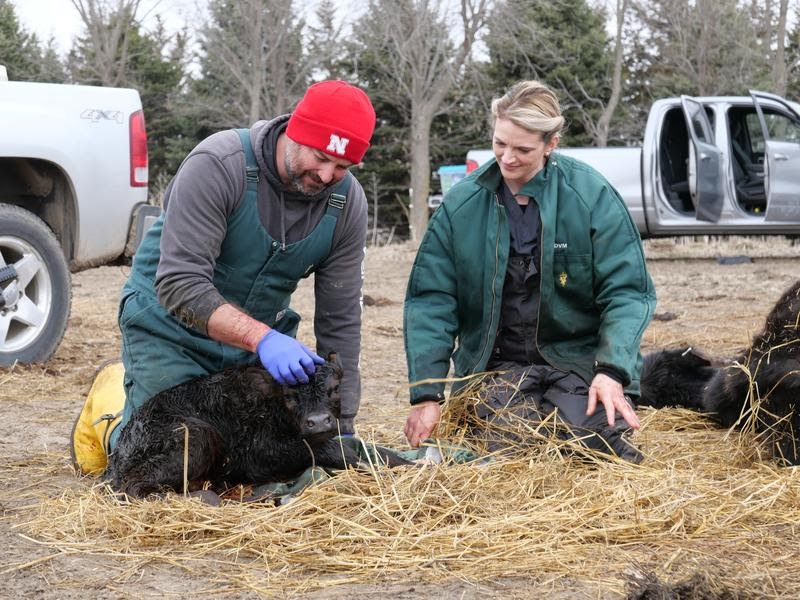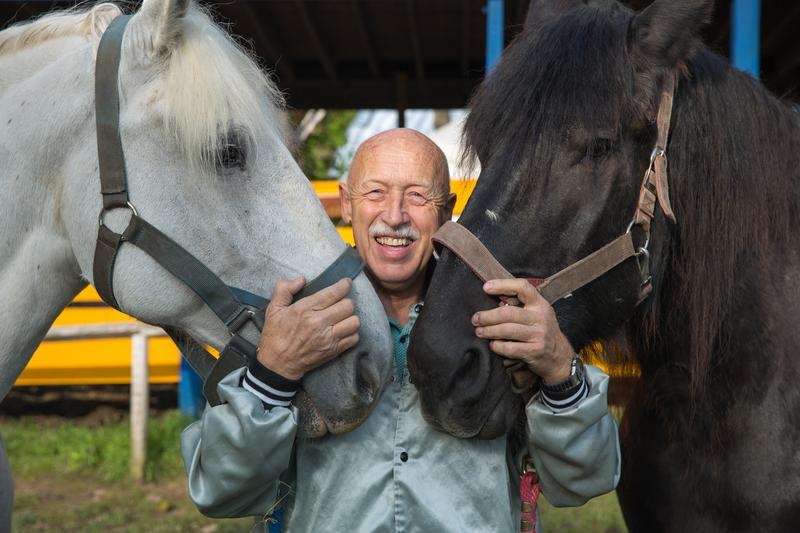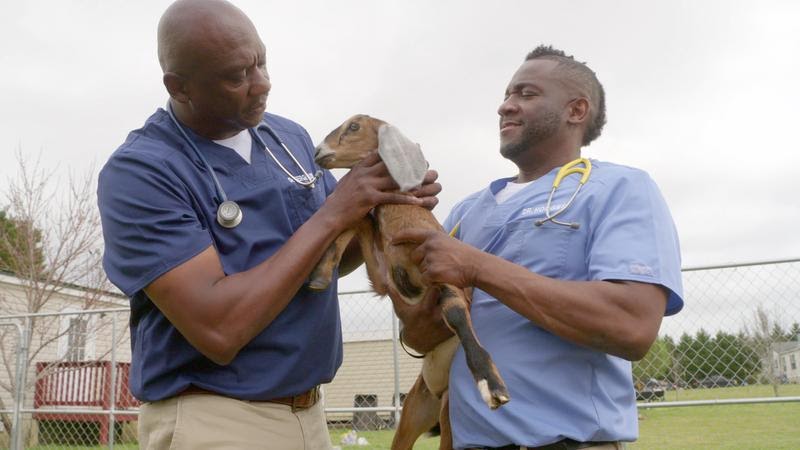National Geographic’s sister network, Nat Geo WILD, debuted in the US on March 29th, 2010. In celebration of the network's 10th anniversary, seven veterinarians from five of the most popular Nat Geo WILD shows got together on a Zoom call to answer questions from reporters about their shows, in addition to caring for pets amidst the Coronavirus outbreak. The guest speakers included:
- Dr. Jan Pol from The Incredible Dr. Pol
- Dr. Michelle Oakley from Dr. Oakley, Yukon Vet
- Dr. Priya Bapodra from Secrets of the Zoo
- Drs. Erin and Ben Schroeder from Heartland Docs, DVM
- Drs. Terrance Fergusson and Vernard Hodges from Critter Fixers: Country Vets
Are Dog Walks Safe?
Dr. Hodges: Well, we don't want to create chaos where we have to isolate the dogs or anything, but just be careful, you know. A lot has to do with the owners. If they’re fine, the animals are fine, too. But definitely I would assume if they’re out walking, then the owners are probably fine.
Dr. Pol: My suggestion actually is when you go for a walk, or that's what we have in Michigan now, yeah, travel only for the important essential people. But we see many walking their dogs, and keep it on the leash. Don't let the dogs go run up to other people and let them pet them. Just control the dog and just enjoy them while you’re home.
Dr. Oakley: Yeah, that's been awesome to see everyone getting out where they can. Where they’re allowed to get out and they can get out and away from other people. But at least their pets are getting lots of attention and that's really nice to see that that's going on.
Do Cats and Dogs Pick Up on Their Owner’s Anxiety During These Times?
Dr. Erin Schroeder: I think it’s negotiable on cats if they’re happy that everybody’s home or not, but actually I feel like animals always pick up on our emotions and anxiety levels in the home, always. But truly, I think for so many people who are home now, this is a jackpot for all of their animals. I mean, this is more together time with their people and their pack than they get for a lot of the time, so I think that that's something really special. That's a huge positive, actually, that we kind of keep reminding people that are feeling distraught and anxious is, you know, look at where your animals are. This is the best case scenario for your dog that you leave every morning and go to work for, and the kids go to school. This is 100% one-on-one time with your pets, so I think that's very soothing to a lot of pets, too.
Dr. Oakley: And I think if we all turn off the news and cuddle up with our pets for a little while and watch all of our good Nat Geo WILD shows together with our pets, we get a lot of messages that people are watching the shows with their pets and they enjoy it. So doing something fun and let yourself relax a little bit, a little less anxiety, that's definitely going to help your pet’s anxiety.
Some People Are Surrendering Their Pets Out of Fear They Can Transmit Coronavirus. Is That True?
Dr. Pol: For me, it is ridiculous to give up your pets because like the CDC has already said, there is no proven thing that the animals can get COVID-19. The one that was in China, the little dog that had the particles in his nose, probably was because the guy that had it blew the particles in the dog’s nose, but the dog wasn’t sick. So yes, if the particles on the dog, it could give it to somebody else, but your dogs in the house don't make you sick. And to be honest with you, when you’re sitting in the house and you get tired of watching Nat Geo Wild, it’s nice to have a dog to talk to.
Is Now a Smart Time For Families to Rescue a Pet?
Dr. Erin Schroeder: I think now is a great time if it is sustainable long-term. If it’s not, then to be a foster would be a fantastic time now if someone’s at home. But just kind of making a last, you know, “I’m home now so I’ll grab a dog and I’m going to have a dog, but I’ve never been able to have one before because I’m too busy,” I mean, I think we all know life will return to normal at some point. And so you don't want a dog, pets aren’t disposable, so make sure to be a foster if it’s short-term and maybe be a forever home if it’s something that will fit into your life forever.
Dr. Ferguson: Yeah, just the responsibility of having an animal is just like have a child. Usually you have to feed, you have to walk, you have to water whatever it is, and my experience where we talked about a lot of people are adopting animals now, and my hope and prayer is they understand what their responsibilities are, and when things go back to normal, they continue their responsibilities and not flood these animal shelters with animals, so that's my fear, but as long as they understand what their responsibilities are. It’s not… you can’t go back to normal anymore because you have an animal and you have to make sure the animal is taken care of, so that's what I want everybody to understand.
Are Vets Sitting on Supplies That Medical Doctors Need?
Dr. Ferguson: I know here in Georgia, it’s funny, we received a questionnaire yesterday from the Georgia Veterinarian Medical Association really asking where our supplies were… Like masks, for example, do we have enough for how many days, and they’re trying to gather their surplus. Anything that they can share with the human side and that's why we cut back a lot on our elective surgeries so that we could conserve some of those things so they are available. They also talked about anesthesia machines, trying to convert them over for ventilators, so we have been working collaboratively with them and our local governing body.
Dr. Oakley: So we’re in a little different situation because we just returned from Australia from helping with the bush fires, so when we got here just a few days ago, we’ve been self-quarantined. So I actually can’t go to our clinic where we have a lot of things stored. That's actually across the border in Alaska, so we’re a little stuck. But I am having someone go to look because we did have a lot of masks and things like that and they’re going to donate them to the local nursing station when they’re tracked down. And we have been asked to do that, both here in Canada and of course in the U.S. So any kind of masks that we have, same thing, we have a couple of anesthesia machines that we’ve offered up, so when they’re needed then we can pass those along if they can be adapted into a ventilator.
Dr. Ben Schroeder: The only thing that I can say that we’ve been affected with, there’s a lack of thermometers on the human side around here. And I can still get a bunch of thermometers from our veterinary supplier, so we’ve got people coming in and getting thermometers just in case they want to take their temp or do those kind of things. But otherwise, not so much here.
Are You Still Taking Vet Appointments?
Dr. Ferguson: I think the main thing is that you should talk to the hospital, and then between you and the veterinarian or the technician can determineif it’s something that needs to come in or it’s something that can wait. And it really depends on what it is, so the main thing is just the communication and triage over the phone and just see if it needs to come in.
Dr. Oakley: Yeah, and even some things that aren't critical, like if you have a mass removal that you’ve tested and it isn’t cancerous, there’s things like that that can wait a little bit. It’s not ideal, but it’s better to take care of the ER cases like the urgent surgeries and cases.
Dr. Ben Schroeder: We have definitely put off the routine dental cleanings for a while here for sure.
Dr. Oakley: And then each one of us have either state or different provincial associations as well that are sending updates and giving us advice. Actually, one interesting thing that's changed for us, and it will be interesting to see how it continues or not, is that we’re allowed to do more telemedicine now. And maybe some states have already allowed it but some haven't, but at least in some of the Canadian provinces, telemedicine, which is certainly not ideal, but it is being allowed in cases where people can’t get out or the vet can’t get out. And I can’t tell you how helpful that is for me because I work with people in really remote areas anyway, so to be able to do the best we can by me facetiming and looking and seeing and trying to get them to take the animal’s temperature, trying to get them to show me things, and again, of course, just like telemedicine that they’re doing for people, it’s not ideal but it is something you can do to talk to people and help them if they can’t possibly do anything else.
With so many Zoos Closed, What’s It Like Without Visitors?
Dr. Priya: We closed to the public, I think it’s been a week-and-a-half. We still have all of our keeper staff, we still have all of our veterinary staff, so obviously all the animals are still getting all the care that they need. The vet staff in particular, and this is zoo-wide, but in terms of the vet staff, we’ve broken down into three non-overlapping teams. So if one team happened to get sick or be in contact with someone that's positive, that team gets shunted out and then the other teams are available because there’s been no cross-contamination, or at least that's the theory. We’re taking all the precautions we can, being on grounds and seeing the animals. We’re still doing, as all of the vets have said, doing our duty and going down and seeing animals in person, but whenever we can get pictures and videos from some of our animals for some of the week checks, we absolutely do to try and reduce that face-to-face contact with keepers. It’s definitely a trying time, everyone’s really trying to stay positive with doing a lot of social media stuff to keep people engaged and essentially keep people happy and share some of our fun stories. We just had a new penguin born called Mr. Charmin Sprinkle Bottom, so we’re trying to stay positive and get everyone through this.
Why Do You Think Your Shows Have Had So Much Success on Nat Geo WILD?
Dr. Pol: Most likely, it’s the animals that I think pull the people back to view. What do you guys think?
Dr. Oakley: Yeah, I think the family show aspect for a lot of our shows. Like I know Dr. Pol, you and Charles work together, and I work together with my daughters, and the zoo show and you guys working together. It’s a lot of us working with either close friends or family, and it’s a show that families can sit down and watch together, which is hard. It’s hard to find shows you can watch with your families anymore.
Dr. Ferguson: I know for us, it’s funny, I was telling Dr. Hodges the other day, a lot of people after watching the show, call us like, “Hey, we have so much more respect for you all. You guys are smart, I didn't know all that happened.” So I’m like, did they think we were dumb initially? It’s just that they get to see the inside so they just have a different perspective of what we do, so it definitely enhances the profession.
Dr. Oakley: Yeah, we get a lot of messages from kids and young women, too, that watch myself and my daughter on the show that are really excited. Not just about how they care for their own animals but about maybe becoming animal carers, so veterinarians or vet techs or volunteering at a wildlife place or a shelter, that inspirational part of it. It’s not just about, well, they take care of their own pet, but it’s that they’re inspired to kind of maybe do what we’re doing and help a lot of different animals and help show other people the best way to care for their animals or just help animals in need in general, so that's pretty exciting to see that.
Dr. Priya: And for us, it was one of the major impetuses of doing Secrets of the Zoo, is just being able to connect people with wildlife. And if you have a dog or a cat and you take them to the clinic, you kind of have a little bit of an idea of that face-to-face contact, but being able to demonstrate what we do in a zoo and being able to kind of connect these people with these non-domestic animals and some of their conservation messaging and all of that stuff has been really important. And I completely second what Dr. Oakley said. We get so many messages from just little kids saying, “Hey, I came to the zoo,” or “I saw the show,” or “Hey, I came to visit Emet and I want to be a keeper” or “I want to be a vet,” and whenever you’re having a bad day, you can just pull out some of these really cute cards and letters and it really perks you up. So I think we have a huge role to play with inspiring our next generation of animal carers.
How to Watch
Past seasons of The Incredible Dr. Pol and Dr Oakley, Yukon Vet are now streaming on Disney+. Secrets of the Zoo, Heartland Docs, DVM, and Critter Fixers: Country Vets may be available through your cable or streaming provider’s on-demand content. New episodes of Critter Fixers: Country Vets and Secrets of the Zoo are currently airing wekends on Nat Geo WILD.





